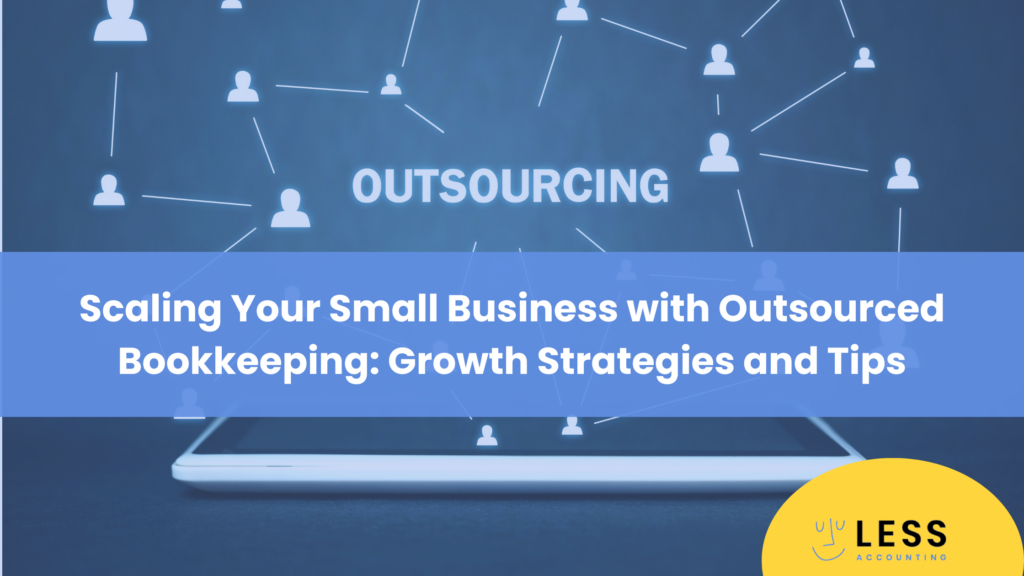Scaling Your Small Business with Outsourced Bookkeeping: Growth Strategies and Tips

As a small business owner, you know the importance of keeping your financial records accurate and up-to-date. However, as your business grows, so do the complexities of managing your books.
This is where outsourced bookkeeping can play a crucial role in scaling your operations efficiently. In this blog post, we’ll explore various growth strategies and tips for leveraging outsourced bookkeeping services to propel your small business forward.
Overwhelmed keeping your business finances organized? We can help!
Understanding the Need for Outsourced Bookkeeping
Before delving into strategies, let’s first understand why outsourced bookkeeping is essential for scaling your small business. As your business expands, managing finances becomes more intricate.
Outsourcing bookkeeping tasks to professionals not only frees up your time but also ensures accuracy and compliance with regulatory requirements.
Moreover, outsourcing allows you to access specialized expertise without the overhead costs associated with hiring full-time staff.
Growth Strategies with Outsourced Bookkeeping
Focus on Core Competencies: As a business owner, your time is valuable. By outsourcing bookkeeping tasks, you can redirect your focus towards core business activities such as product development, marketing, and customer service.
This strategic allocation of resources fosters growth and innovation within your organization.
Scalability: Outsourced bookkeeping services are highly scalable. Whether you’re experiencing rapid growth or seasonal fluctuations, outsourcing allows you to adjust your financial management needs accordingly.
This flexibility ensures that your business operations remain streamlined and adaptable to changing market conditions.
Cost-Effectiveness: Hiring and training in-house bookkeeping staff can be costly and time-consuming. Outsourcing eliminates these overhead expenses, offering a cost-effective solution for managing your finances.
Additionally, you only pay for the services you need, making it a budget-friendly option for small businesses looking to scale efficiently.
Access to Expertise: Professional bookkeeping firms employ skilled professionals with extensive experience in financial management.
By outsourcing, you gain access to this specialized expertise, ensuring that your books are handled with precision and proficiency. This level of proficiency minimizes errors and enhances decision-making processes within your organization.
Compliance and Risk Management: Staying compliant with tax regulations and financial reporting standards is crucial for small businesses.
Outsourced bookkeeping services are well-versed in regulatory requirements, reducing the risk of non-compliance penalties and audits. Additionally, professional bookkeepers implement robust risk management practices, safeguarding your business against financial discrepancies and fraud.
Tips for Maximizing the Benefits of Outsourced Bookkeeping
Communication is Key: Establish clear lines of communication with your outsourced bookkeeping provider.
Regular updates and feedback ensure that both parties are aligned with your business objectives and financial goals.
Utilize Technology: Leverage accounting software and cloud-based platforms to streamline collaboration and data sharing with your bookkeeping team.
This technological integration enhances efficiency and transparency in financial reporting processes.
Review Financial Reports Regularly: Stay informed about your business’s financial health by reviewing reports generated by your bookkeeping service.
These insights enable you to make informed decisions and identify areas for improvement or growth opportunities.
Set Realistic Goals: Define measurable objectives and key performance indicators (KPIs) for your business.
Collaborate with your bookkeeping provider to track progress towards these goals and adjust strategies accordingly.
Evaluate Performance: Periodically assess the performance of your outsourced bookkeeping service.
Solicit feedback from stakeholders and conduct performance reviews to ensure that expectations are being met and value is being delivered.
How Less Accounting Can Help
This is where Less Accounting steps in.
Bookkeeping is not just a regulatory requirement but a strategic tool essential for informed decision-making. Its benefits are manifold—from improving financial clarity and compliance to enhancing the capacity for strategic planning and investment.
For small business owners, investing in robust bookkeeping practices, whether through training, hiring skilled personnel, or using advanced software solutions, is not an expense but a critical investment in the future of their business.




